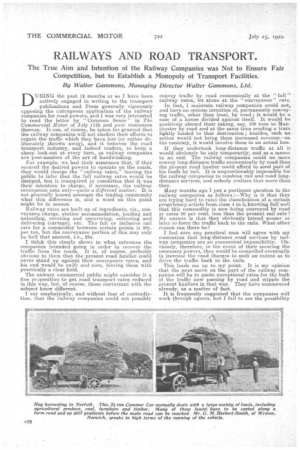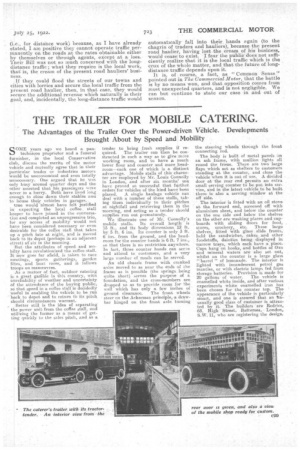RAILWAYS AND ROAD TRANSPORT.
Page 10

Page 11

If you've noticed an error in this article please click here to report it so we can fix it.
The True Aim and Intention of the Railway Companies was Not to Ensure Fair Competition, but to Establish a Monopoly of Transport Facilities.
By Walter Gammons, Managing Director Walter Gammons, Ltd.
DURING the past 12 months or so I have been actively engaged in writing to the transport publications and Press generally vigorously opposing the outrageous application of the railway companies for road powers; and I was _very interested to read the letter by ‘` Oommou sense " in The Commercial Motor of July 11th and your comments thereon. It can, of course, be taken for granted that the railway companies will not slacken their efforts to regain the traffic which they have lost (or rather deliberately thrown away), and it behoves the road transport industry, and indeed traders, to keep a sharp look-out at every turn, as railway companies
are past-masters of the art of hoodwinking. .
For example, we had their assurance that,-if they secured the desired powers to operate on the roads, they would charge the "railway rates," leaving the public to infer that the full railway rates would be charged, but it transpired in committee that it was their intention to charge, if necessary, the railway conveyance rate only—quite a different matter. It is not generally known amongst the trading community what this difference is, and a word on this point might be in season.
Railway rates are built up of ingredients, viz., conveyance charge, station accommodation, loading and unloading, covering and uncovering, collecting and delivering (cartage), etc. The full or inclusive rail rate for a commodity between certain points is 509. per ton, but the conveyance portion of this may only be half that amount, i.e., 25s. .
I think this clearly shows to what extremes the companies intended going in order to recover the traffic from the roads. It is, of course, perfectly obvious to them that the present road haulier could never stand up against their conveyance rates, and his end would be swift and sure, leaving them with practically a clear field. • The unwary commercial public might consider it a fine prvosition to get road transport rates reduced in this way, but, of course, those conversant with the subject know different.
/ say emphatically, and without fear of contradiction, that the railway companies could not possibly convey traffic by road economically at the " full " railway rates, let alone at the "conveyance" rate.
In fact, I maintain railway companies could not, and have no serious intention of, permanently conveying traffic, other than local, by road; it would be a case of a house divided against itself. It. would be positively absurd their taking, say, 100 tons to Man: chester by road and at the same time sending a train lightly loaded to that destination; besides, such an • action would not bring them increased revenue—on the contrary, it would involve them in an actual loss.
If they undertook long-distance traffic at all it would obviously be only temporarily, and as a means to an end. The railway companies could no more convey long-distance traffic economically by road than the present road haulier could afford to send part of his load's by rail. It is unquestionably impossible for the railway.coinpanies to combine rail and road longdistance services, and nobody realizes that more than they.
Many"tnonths ago I put a pertinent question to the railway companies as follows :—Why is it that they are trying hard to raise the classification of a certain proprietary article from class 4 to 5, knowing full well that this commodity is now being conveyed by road at rates 50 per Cent. less than the present rail rate I lVty answer is that they obviously intend sooner or later to force the traffic back to the rails. What other reason can there be?
feel sure any practical man will agree with my contention that long-distance road services by railway companies are an economical impossibility. Obviously, therefore, in the event of their securing the necessary powers, they would be compelled eventually to increase the road charges to such an extent as to drive the traffic back to the rails.
This leads me up to my point. It is my opinion that the next move on the part of the railway companies will be to quote exceptional rates for the bulk of the traffic now passing by road and cripple the present hauliers in that way. They have commenced already, as a matter of fact.
It is frequently suggested that the companies will work through agents, but I fail to see the possibility (i.e., for distance work) because, as I have already stated, I am positive they cannot operate traffic permanently om the roads at the rates obtainable either by themselves or through agents, except at a loss. Their Bill was not so much concerned with the longdistance traffic ; what they require is the local work, that is, the cream of the present road hauliers' business.
If they could flood the streets of our towns and cities with lorries and secure the loCal traffic from the present road haulier, then, in that ease, they would secure the additional revenue which naturally is their goal, and, incidentally, the long-distance traffic would
automatically fall into their hands again (to the chagrin of traders and hauliers), because the present road haulier, having lost the cream of his business, would cease to exist. I fear the public. does not sufficiently realize that it is the local traffic which is the crux of the whole matter, and that the future of longtlistance traffic depends upon it. It is, of course, a fact, as "Common Sense" pointed out in The Commercial Motor, that the battle is by no means won, and that opposition comes from most unexpected quarters, and is not negligible. We can but continue to state our case in and out of season.






























